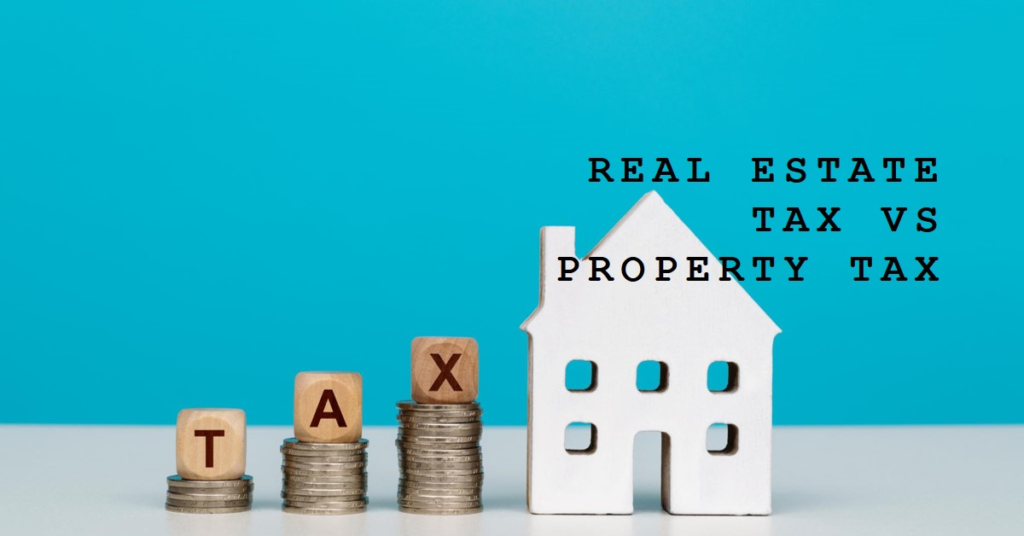
Table of Contents
- Introduction:
- Defining Real Estate Tax and Property Tax:
- Understanding Assessment Methods:
- Legal Basis and Authority:
- Implications for Property Owners:
- Taxation of Real Estate Improvements:
- Exemptions and Deductions:
- Appeals and Dispute Resolution:
- Long-Term Financial Planning:
- Conclusion:
Introduction:
Navigating the world of real estate can be a daunting task, especially when it comes to understanding the various taxes associated with property ownership. Among these, real estate tax and property tax are two terms often used interchangeably, leading to confusion. However, they are distinct concepts with their own sets of rules and implications. In this comprehensive guide, we’ll delve into the disparities between real estate tax and property tax, shedding light on their definitions, differences, and significance for property owners.
Defining Real Estate Tax and Property Tax:
Before diving into their disparities, it’s essential to grasp the fundamental definitions of real estate tax and property tax. Real estate tax refers to the tax levied by the government on the value of a property, including land and any structures erected on it. This tax is typically assessed annually and is based on the property’s assessed value determined by local authorities. On the other hand, property tax encompasses a broader spectrum, incorporating taxes imposed by various levels of government—local, state, and sometimes federal—on both real estate and personal property. While real estate tax is a subset of property tax, the latter encompasses taxes beyond real estate, such as vehicles and equipment.
Understanding Assessment Methods:
The assessment methods for real estate tax and property tax play a pivotal role in determining the amount owed by property owners. Real estate tax assessments primarily rely on the market value of the property, considering factors like location, size, condition, and comparable sales in the area. Assessors may also consider income generated by the property or its potential for future income. Conversely, property tax assessments encompass a broader range of assets and may include both real property and personal property. The assessment methods for personal property can vary significantly, ranging from depreciated value to replacement cost.
Legal Basis and Authority:
Another crucial aspect that distinguishes real estate tax from property tax is their legal basis and authority. Real estate tax is governed by local government entities, such as municipalities or counties, which have the authority to assess and collect taxes on properties within their jurisdiction. These taxes are typically used to fund local services like schools, infrastructure, and emergency services. Property tax, however, derives its legal basis from a combination of local, state, and sometimes federal laws, depending on the jurisdiction. While local governments assess and collect property taxes, state laws often dictate assessment procedures, exemptions, and limitations.
Implications for Property Owners:
Understanding the disparities between real estate tax and property tax is crucial for property owners, as it directly impacts their financial obligations and rights. Real estate tax liabilities are tied directly to the value of the property and can fluctuate over time based on changes in the property’s assessed value or tax rates imposed by local authorities. Property owners must stay informed about these fluctuations to budget effectively and avoid any surprises come tax time. Conversely, property tax encompasses a broader array of assets, including real estate and personal property, which may require owners to account for multiple tax liabilities.
Taxation of Real Estate Improvements:
One of the distinguishing factors between real estate tax and property tax is the treatment of improvements made to the property. Real estate tax primarily focuses on taxing the value of the land and any structures erected on it. Therefore, improvements such as renovations, additions, or upgrades to existing structures can impact the property’s assessed value and subsequently increase the real estate tax liability. Property tax, on the other hand, may extend beyond real estate improvements to include personal property such as furniture, equipment, or machinery located on the premises.


Exemptions and Deductions:
Both real estate tax and property tax offer exemptions and deductions that can alleviate the tax burden for qualifying property owners. Real estate tax exemptions may be available for certain categories of properties, such as primary residences, agricultural land, or properties owned by nonprofit organizations. These exemptions reduce the property’s assessed value, thereby lowering the tax liability. Similarly, property tax deductions may be available for specific purposes, such as home improvements for energy efficiency or historical preservation. Understanding these exemptions and deductions can significantly impact the overall tax burden for property owners.
Appeals and Dispute Resolution:
Despite efforts to accurately assess property values, disputes may arise between property owners and taxing authorities regarding tax assessments. In such cases, both real estate tax and property tax systems typically provide mechanisms for appeals and dispute resolution. Property owners have the right to challenge their property’s assessed value through administrative appeals or formal hearings, presenting evidence to support their claims. Similarly, property tax assessments may be subject to review through administrative channels or legal proceedings, ensuring that assessments are fair and accurate.
Long-Term Financial Planning:
The disparities between real estate tax and property tax underscore the importance of long-term financial planning for property owners. Understanding the implications of these taxes allows owners to make informed decisions regarding property acquisitions, improvements, and investments. By incorporating potential tax liabilities into their financial projections, property owners can mitigate risks, maximize returns, and optimize their overall tax strategy. Additionally, staying abreast of changes in tax laws, exemptions, and assessment methodologies enables property owners to adapt their strategies proactively, minimizing tax liabilities and maximizing financial outcomes.
Conclusion:
In conclusion, distinguishing between real estate tax and property tax is essential for property owners to navigate the complexities of property ownership effectively. While both taxes share commonalities, such as their impact on property values and local services, they differ significantly in their scope, assessment methods, and legal authority. By understanding these disparities and their implications, property owners can make informed decisions, minimize tax liabilities, and optimize their long-term financial outcomes in the dynamic landscape of real estate taxation.


